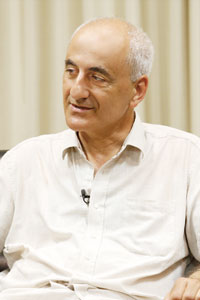Liberalism Revives Nations
The Story of Georgia
Economist

Gia Jandieri
Born in 1961. He graduated from Georgian Technical University and Tbilisi State University before becoming a central election committee member and head of Georgia’s Ministry of Finance. In 2001, he co-founded the New Economic School for which he now serves as the vice-president.
In the past, Georgia experienced the communist regime as part of the USSR. Now the country has made a revival. We interviewed Gia Jandieri who served as a high government official during the reform movements that liberated the country from the communist regime.
Communism Deprives People of Motivation
Interviewer
(I): What are the problems of communism?
Jandieri (J): Simply put, communism deprives people of motivation. Communism doesn’t allow private ownership of property. This means that we will never reap the rewards of all the effort we put in to create something. Naturally, many people in Georgia lost their motivation to work.
I will talk briefly about the history of private property policy in the USSR. Lenin was the leader at the time, and in 1917 he began killing owners of private property, such as farmers. The government ordered the farmers to offer up their produced goods to the government for free. The farmers resisted because their businesses were capital investments. As a result, by 1934 the government had violently seized all privately owned land and killed most of the owners.
Lenin did this not only because he wanted their land to be confiscated, but also because landowners were opposing the government’s malicious schemes. For Lenin, there was a need to exterminate them as a major opponent class.
Stalin’s Great Purge of the late 1930s is very well known, but less people know about Lenin’s purge of property owners because later socialists covered it up. Leftists, in fact, support any actions against private property and owners, and somehow justify those events.
No Private Property = Moral Degradation
When private property was taken away, we lost ethical tradition with it: the old moral rule of “do not steal”. ‘No ownership’ means ‘no one owns it’. People began to think, “If no one owns it, what’s the problem with stealing it?” “Let’s steal as much as we can”. Soviet society became a place where stealing was the norm. If there’s no property then there’s no cooperation between individuals – for what reason should we cooperate? We have no property to respect the property rights of each other.
So in the communist countries where private ownership is rejected, honest and ethical people lose, and corrupt people who accepted bribes and become thieves – lived a better life.
In addition, there is another huge problem. In a central economic authority, such as in a communist state, orders are given for producing goods without having appropriate and dynamic information about the people’s demands: for instance, what color clothes or what material shoes people want to wear. So they produced large quantities of things that no one wanted. There was also an imbalance. For instance, cars were sold at prices well above the demands, but there weren’t enough daily goods such as toilet paper and toothpaste for everyone.
Towards the end of the USSR, Georgia was receiving contradictory commands every hour or so from the central government.
Seeing this chaos in the central government from the receiving end, I had been saying 3 years before the collapse that, “the USSR is near collapse. We should prepare for Georgia’s independence”. At the time everyone laughed at me saying “the USSR is an energy and resource superpower. How could it collapse?” I objected saying, “Japan is able to grow without energy resources; but a corrupt and poverty stricken communist regime can’t last long even if it had resources.” No one listened to me.
GDP Tripled After Independence and Reforms
(I): Georgia’s GDP and GDP per capita tripled between 2004 and 2013. How do you think this economic growth came about?
(J): Georgia’s economic growth is due to the adoption of a free market route after the collapse of the USSR and especially since 2004.
In the reforms of 2004 we aimed to liberalize and simplify the taxation system. We stopped the 22-tax system recommended by the IMF, and reduced it to 6 types; tax rates were also reduced.
I don’t believe in international financial institutes like the World Bank and IMF. They spoon feed developing countries so that it becomes impossible for them without help from the organisation. These international institutes have been operated in many countries in Africa without tangible results. What we need to do is to tell those African countries to “take responsibility for the future of your own country”.
Politician Leadership Vital in Reforms
What is important for politicians is to have a philosophy and a strong mindset in leading the nation through reforms.
In Georgia the President himself explicated his aim to free the economy by following the ideals of the Austrian school of economics: that of von Mises, Hayek and Rothbard. The government accepted the President’s suggestions and amended an article in the Constitution to disallow any additional taxes without public consent via referendum.
Currently, the corporation tax is a flat rate of 15% and the same with the income tax at 20%. We have an election coming up in October, and in the campaigns the parties are competing as to how low they can make the corporation and income tax rates.
Changes brought about in our reforms include streamlining and privatizing public institutions, and cutbacks in the number of civil servants and number of public agencies. Additionally we undertook deregulation, and now people can start businesses without a license or governmental permission registering their company in two hours. This makes it easy to start a business in Georgia. It is so different now compared to when the country was still under communism where all the factories belonged to the state. Back then we needed government permission to do any small thing.
Georgia is now ranked 23rd out of 186 countries in the 2016 economic freedom rankings published by leading think tank, The Heritage Foundation, and The Wall Street Journal. We are just under Japan in the ranking. We rank 16th in the business freedom index, and 3rd in labor [market] freedom.
Abolishing Pension Fund to Induce Filial Support
In 2007, Georgia abolished the social security tax. With their public pension system also abolished, the government no longer has a need to pay pensions. What the government has as a pension is flat, basic assistance money not linked to any contributions or age and stage calculations. Some of the most vulnerable people receive other assistance according to means testing.
(I): Georgia doesn’t have a public pension fund. Does this mean that each person has a need to protect him or herself?
(J): Georgia had an old tradition where children would respect the elderly, and the family supported each other. We simply returned to this good old tradition. One reason the pension was abolished was because the national treasury didn’t have the money to distribute. What made it easier was that no one was able to count how much tax they were paying during the USSR.
While the average life span is getting longer and longer, developed countries in the world are unable to end public pension systems. So they have to raise taxes in order to increase revenue: they are trapped. We decided to break free from this trap, and now we are in no hurry to increase taxes.
Georgia has now become a country with one of the world’s smallest public debts. In 20 years time this financial situation will work to our advantage.
The average life span is increasing in Japan as well. If it becomes close to age 100, the public pension system is sure to collapse. The world ought to follow in the footsteps of Georgia’s policy.
Collectivism was never really part of Georgian culture: it is a country with a strong sense of independence and the people have an entrepreneurial spirit. Throughout history, we have always fought for freedom and a better future. And we will continue to fight for freedom.
(I): Education is imperative to developing the power of competition in a capitalist country. What are your thoughts on Georgia’s education?
(J): Georgia has a school voucher system. Globally, the quality of public schools tends to decline because the principles of competition between schools no longer prevail. In order to solve this issue, the government in Georgia employs a voucher system whereby they issue a voucher to parents to allow the selecting of a school best suited for their child.
However, I think this is not enough. In order to change the education system, parents need to realize that the problem lies with them, and not other people – they are the only people who need to take responsibility regarding their children’s future.
(I): Economist Thomas Piketty has become very popular for his redistribution theory. How do you view this trend?
(J): Margaret Thatcher said that socialists are limited with the situation that one day there’s no more money remaining to re-distribute. If the government continues to heavily tax wealthy people and redistributes that money, ultimately the money will run out in the country and redistribution will fail. It cannot be sustained.
What is needed is economic growth and a decrease in taxes. That way, even the government will receive more revenues. The leftists who support redistribution must realize this simple logic.



















